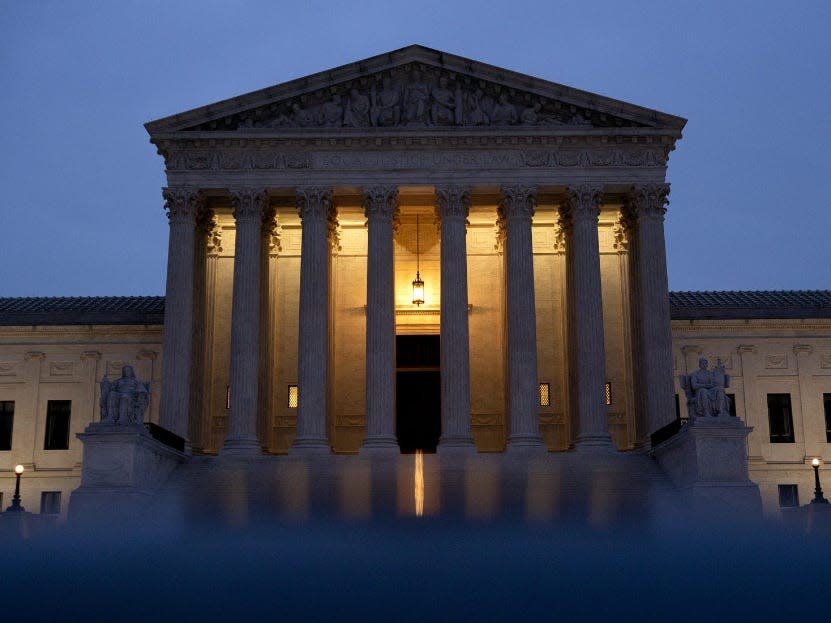Biden's plan to overhaul the Supreme Court is 'dead on arrival'

- Oops!Something went wrong.Please try again later.
- Oops!Something went wrong.Please try again later.
- Oops!Something went wrong.Please try again later.
House Speaker Mike Johnson said Biden's Supreme Court proposal was "dead on arrival."
Biden's plan includes term limits, a binding code of conduct, and no immunity for ex-presidents.
But to get the changes through, Biden would need full Democratic control — or help from Republicans.
President Joe Biden's pitch to rein in the Supreme Court is off to a rough start.
House Speaker Mike Johnson has already sworn to fight the Biden administration's proposal to overhaul the Supreme Court, calling it "dead on arrival."
Biden's proposal, announced in a White House press release on Monday, calls on Congress to make three major changes to the high court: setting up 18-year term limits for all justices, creating a binding code of conduct for those justices, and approving a constitutional amendment that explicitly says former presidents aren't immune from prosecution for crimes committed while in office.
Citing "recent ethics scandals" among the court's justices and its recent decisions overturning "long-established legal precedents protecting fundamental rights," Biden wrote that these changes were necessary to "restore trust and accountability" in both the president and the Supreme Court.
The court has been a source of frustration for Democrats, with the conservative-led panel handing former President Donald Trump and his allies victory after victory — culminating in a decision that ruled sitting presidents are granted presumptive immunity from prosecution.
That ruling snarled the various criminal cases against Trump, who was convicted of fraud in New York and faces allegations of mishandling classified documents and conspiring to overturn the 2020 election.
Two of the Supreme Court's conservative justices, Clarence Thomas and Samuel Alito, have also been tied up in scandals. Thomas was gifted lavish vacations from a GOP megadonor without disclosing them, and his wife communicated with Trump aides before the Capitol riot. Meanwhile, a flag bearing symbols linked to pro-Trump movements flew over Alito's house about the time of the riot; he's since blamed his wife.
Despite the push from Biden for changes to the court, Johnson threw cold water on the idea immediately.
"President Biden's proposal to radically overhaul the U.S. Supreme Court would tilt the balance of power and erode not only the rule of law, but the American people's faith in our system of justice," Johnson wrote Monday on X.
He added: "It is telling that Democrats want to change the system that has guided our nation since its founding simply because they disagree with some of the Court's recent decisions. This dangerous gambit of the Biden-Harris Administration is dead on arrival in the House."
Amendment on presidential immunity
Biden's plan includes adding a "No One is Above the Law" amendment to the Constitution, which would dictate that no president has "immunity from federal criminal indictment, trial, conviction, or sentencing by virtue of previously serving as President," the press release said.
But amending the Constitution isn't easy; it's been done only 27 times, most recently in 1992.
There are a few ways to propose a change to the Constitution that the Founding Fathers outlined. The first requires two-thirds support from members of both the House and Senate — a feat that would be nearly impossible to accomplish with Republicans controlling the House.
The GOP has largely supported the Supreme Court's conservative majority and has rebuked Democrats' attempts to limit its power.
The second option requires two-thirds of state legislatures to call a convention to propose a change to the Constitution.
And that's just to get the amendment proposed — to get it ratified, three-fourths of state legislatures must support the amendment.
This would also be a tough task with 23 states controlled by Republican trifectas (meaning the GOP runs both branches of a state's legislature and the governor's office) and 10 states having divided governments; only 17 states are controlled by Democratic trifectas, according to Ballotpedia.
Term limits and a new code of conduct
Biden's plan for the Supreme Court includes term limits under which a new justice would be chosen every two years.
In an op-ed for The Washington Post, Biden wrote, "Term limits would help ensure that the court's membership changes with some regularity. That would make timing for court nominations more predictable and less arbitrary. It would reduce the chance that any single presidency radically alters the makeup of the court for generations to come."
Biden also said in the Post that "the court's current voluntary ethics code is weak and self-enforced" and that a binding, enforceable code of conduct should require justices "to disclose gifts, refrain from public political activity and recuse themselves from cases in which they or their spouses have financial or other conflicts of interest."
The court's current ethics code, implemented in November, is not binding and does not contain any enforcement mechanism.
A measure for both term limits and a stricter ethics code for justices would require the Republican-controlled House to not only allow a floor vote on the issue but also then pass it. Even if the House approved the bill, Republicans in the Senate could filibuster it, stopping it in its tracks.
Democrats would likely need to throw out the filibuster — something they already lack the votes to do — to even bring the legislation to a vote.
With powerful Republicans like Johnson already pushing back, getting all three of Biden's proposals implemented in the Supreme Court looks like a losing battle. But Biden's plan has gotten support from Vice President Kamala Harris, the presumptive Democratic nominee, which all but guarantees that Democrats will use it on the campaign trail as a contrast to Trump.
Read the original article on Business Insider

